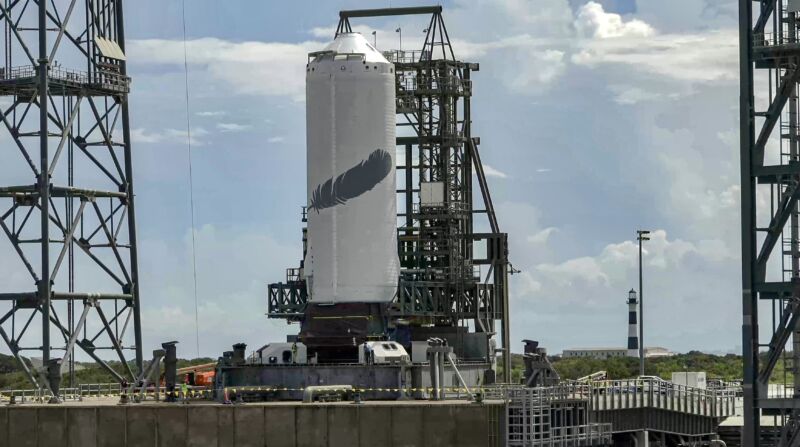
Enlarge / The second stage of the New Glenn rocket rolled to the launch site this week.
Blue Origin
NASA and Blue Origin announced Friday that they have agreed to delay the launch of the ESCAPADE mission to Mars until at least the spring of 2025.
The decision to stand down from a launch attempt in mid-October was driven by a deadline to begin loading hypergolic propellant on the two small ESCAPADE (Escape and Plasma Acceleration and Dynamics Explorers) spacecraft. While it is theoretically possible to offload fuel from these vehicles for a future launch attempt, multiple sources told Ars that such an activity would incur significant risk to the spacecraft.
Forced to make a call on whether to fuel, NASA decided not to. Although the two spacecraft were otherwise ready for launch, it was not clear the New Glenn rocket would be similarly ready to go.
Waiting on the rocket
NASA procured the debut launch of the New Glenn rocket, which was developed by Blue Origin, for a significant discount. The mission’s managers, University of California, Berkeley’s Space Sciences Laboratory, always understood there were timeline risks with launching on New Glenn.
Blue Origin appears to have worked with some urgency this year to prepare the massive rocket for its initial launch. However, when the company missed a key target of hot firing the rocket’s upper stage by the end of August, NASA delayed fueling of the ESCAPADE mission. Now, with the closing of a Mars launch window next month, NASA will not fuel the spacecraft until next spring, at the earliest.
Founded by Amazon’s Jeff Bezos, Blue Origin successfully rolled the New Glenn second stage to its launch pad at Launch Complex-36 in Florida on Tuesday. The company is now targeting Monday, September 9, for a hot fire test of the second stage.
At the same time, preparations for the rocket’s first stage are nearing completion. All seven of the rocket’s BE-7 engines have arrived at the launch site following acceptance testing. Engineers and technicians are presently attaching the engines to the first stage of the vehicle.
Blue Origin will now pivot to launching a prototype of its Blue Ring transfer vehicle on the debut launch of New Glenn, with the intent of testing the electronics, avionics, and other systems on the vehicle. Blue Origin is targeting the first half of November for this launch. This test flight will also serve as the first of three “certification” flights for New Glenn, which will allow the vehicle to become eligible to carry national security payloads for the US Space Force.
A sense of urgency
It’s nearly been a year since Bezos tapped a former Amazon executive, Dave Limp, to lead Blue Origin. Bezos tasked the company’s new chief executive with injecting a sense of purpose toward getting New Glenn flying as soon as possible. Bezos has made a launch this year a high priority.
In an email to Blue Origin employees on Friday, Limp expressed that sense of urgency.
“We can’t take our foot off the pedal here,” Limp wrote. “Everyone’s work to get us to NG-1 flight this year is critical and I’m so appreciative of everyone’s relentless dedication to make this happen.”
As for ESCAPADE, the mission could launch in the spring of 2025. Although the “Mars window” only opens every 18 to 24 months, there are complex trajectories by which a payload launched in the spring of 2025 could reach the red planet. It’s also possible that NASA and Blue Origin could ultimately wait until the next Mars window opens in November 2026 to launch the mission.